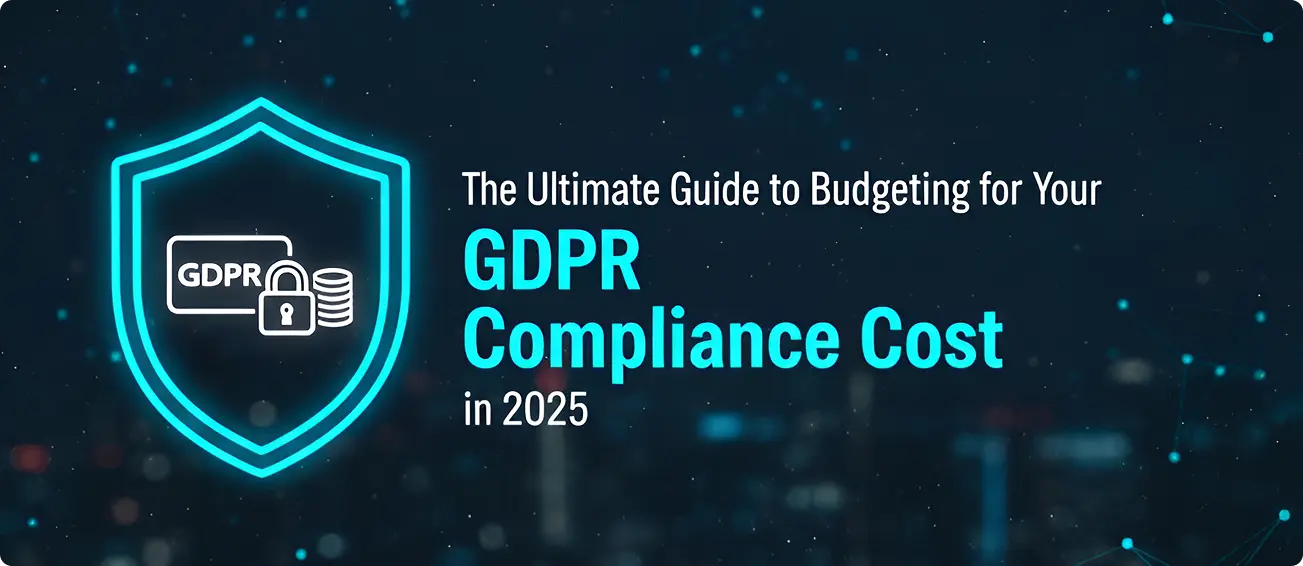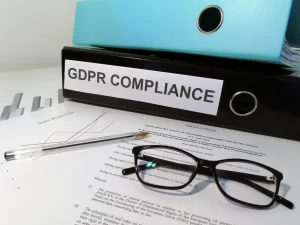Every business owner knows that smart money management drives success. Therefore, you must carefully examine all large investments. Implementing the General Data Protection Regulation (GDPR) is a key financial choice, not simply a legal task. Consequently, many businesses feel anxious about the high and complex GDPR Compliance Cost.
GDPR compliance is a vital data protection regulation. It aims to give data subjects control over their sensitive information and personal data. It sets clear rules for how organizations handle data collection, data processing, and data secure storage, especially for EU citizens. Crucially, ignoring the rules brings huge penalties. The maximum GDPR fines cost can reach €20 million or 4% of global annual sales, whichever amount is higher. Naturally, this leads to an important question: What is the real GDPR certification cost? This clear and detailed guide comes from Defend my Business, which works with expert partners to offer you a breakdown of the costs of gdpr, the factors involved, and smart ways to reduce your spending.
Get a personalized compliance cost estimate from our experts, before you commit to spend.
What is GDPR Compliance?
The General Data Protection Regulation (GDPR) enforces a high standard GDPR Regulations for protecting personal data across the European Union (EU) and European Economic Area (EEA).
Why Does GDPR Compliance Matter for Businesses?
GDPR compliance matters because it makes your data processing activities legitimate. Following the rules shows you are committed to your customers’ privacy, which builds great trust. Moreover, securing your data is simply a necessary best practice in today’s digital world.
Penalties of Non-Compliance
Ignoring the rules is extremely expensive. The cost of non compliance is crippling. As our research shows, recent major fines prove how serious breaches are, often reaching the maximum of €20 million or 4% of annual global revenue. Furthermore, the damage to your reputation and legal fees typically cost far more than the fine itself.
Factors That Influence GDPR Compliance Cost
The final GDPR Compliance Cost varies widely, based on several key things about your organization.
Company Size & Industry
Very large multinational organizations definitely face higher compliance activities than small to medium sized companies. For example, data suggests small IT firms saw a much bigger profit drop (12.1%) after GDPR started compared to larger IT companies (4.6%). This proves the higher relative GDPR compliance cost for small businesses. Similarly, financial and tech industries usually pay the most in Data Security Service costs due to the sheer volume and sensitive nature of their data.
Number of Employees & Data Subjects
More employees handling sensitive data and a larger group of data subjects mean higher complexity in mapping compliance processes and doing the initial gap analysis.
Technology Infrastructure
Companies using older, separate systems need to invest more in new technology. This means buying solutions for data encryption, central data mapping, and data secure storage.
Legal Consultation & Audits
GDPR Compliance Consultants are essential to understand the complex data protection regulation GDPR. Consequently, companies without in-house legal readiness spend more on external counsel and the first GDPR audit cost.
Ongoing Monitoring & Training
Achieving and maintaining GDPR compliance requires constant effort. Therefore, continuous spending on monitoring tools and regular staff training are necessary budget items. These represent a steady commitment of time and money.
GDPR Compliance Cost Breakdown
The total money needed to create a data secure environment falls into three main areas: one-time setup costs, ongoing operational costs, and specific technology spending.
One-Time Costs
Initial Audits and Gap Analysis
This step identifies where your current data processing and storage methods fail to meet the regulation. This is the main GDPR audit cost.
Legal Documentation
Creating, reviewing, and setting up all necessary legal paperwork, such as Privacy Notices, Data Processing Agreements (DPAs), and Records of Processing Activities (ROPAs).
External Consulting Fees
Payments to expert consultants who plan, design, and implement the first compliance processes.
Ongoing Costs
Cost of Data Protection Officer (DPO)
Companies processing large amounts of sensitive data or doing wide-scale monitoring must hire a DPO. This involves a substantial annual salary or a retainer for outsourced services.
Staff Training
Required, regular training makes sure employees properly handle personal data and understand their role in GDPR compliance.
Monitoring Tools & GDPR Compliance Software Pricing
Subscription fees for tools that offer continuous monitoring, risk assessment, and consent management.
Tech Investments
Data Encryption & Pseudonymization
Upgrading systems to guarantee sensitive data is protected both during transfers and while stored.
Breach Response Systems
Setting up an incident plan and the technical capability for quickly detecting and reporting a data breach.
Third-party Service Provider Costs
These are the fees for external legal advisors, compliance consultants, and specialized security vendors whose GDPR compliance services pricing ensures a professional setup.
Average GDPR Compliance Cost for Businesses
Costs change dramatically based on how large your business is. The GDPR compliance cost for small business is much lower than for a global corporation.
| Business Size | Initial Setup & First-Year Costs | Annual Maintenance Cost Range |
|---|---|---|
| Small Businesses (SMBs) | $20,500 – $102,500 | $10,000 – $50,000 |
| Medium Enterprises | $100,000 – $500,000 | $50,000 – $200,000+ |
| Large Corporations / Multinational Organizations | $1 Million – $10 Million+ | $1 Million – $10 Million+ |
It is important to note that most small businesses use a GDPR compliance checklist cost strategy combined with automation to limit external consulting expenses. For large companies, the spending is enormous; 88% of global firms spend over $1 million annually on GDPR compliance, and 40% spend over $10 million (PwC data).
How to Reduce GDPR Compliance Costs Without Risking Fines
Reducing the GDPR Compliance Cost means making smart choices, not taking shortcuts.
- Outsourcing vs. In-house :- Hiring a full-time, internal Cost of Data Protection Officer (DPO) is a huge cost. However, many businesses find that hiring an outsourced managed compliance service for the DPO function is cheaper, especially for medium sized or smaller organizations.
- Automation & Compliance Software :- Investing in good GDPR compliance software pricing offers the best long-term cost savings. Specifically, modern automated tools make manual, repetitive tasks easy. These include data mapping, handling Data Subject Access Requests (DSARs), and gathering proof for your GDPR audit cost. This greatly reduces the human effort and associated time and money.
- Staff Training Strategies :- Use continuous, low-cost micro-learning sessions instead of expensive, single seminars. This keeps employees aware of how to handle sensitive information correctly, dramatically lowering the chance of human error causing a data breach.
- Leveraging Managed Compliance Services :- These services take care of the heavy lifting for achieving and maintaining GDPR compliance, often for a predictable monthly fee. Ultimately, this moves the responsibility and risk away from your internal teams.
Discover automated compliance & outsourcing options tailored to your business size and needs.
Hidden Costs of GDPR Compliance
Even with a perfect budget, several unexpected expenses—the real cost of non compliance—can destroy a company’s finances.
- Data Breach Remediation :- Beyond the fines, a breach requires expensive, mandatory fixes. As a result, the average cost of a data breach is about €3.94 million. This includes forensic work, notification fees, and recouping lost business.
- Legal Disputes :- Lawsuits from data subjects whose personal data was compromised can quickly add up.
- Reputational Risks & PR Management :- Losing customer trust, which is hard to put a number on, can be the biggest long-term cost. Furthermore, news of a fine or a breach often makes customers leave, leading to lost sales and a lasting disadvantage against competitors. Protecting personal data is truly an investment in your brand’s reputation.
Table Summary of Costs Breakdown
| Type of Cost | Item | Cost Range & Context |
|---|---|---|
| Initial Investment (One-Time) | GDPR Audit Cost & Gap Analysis | $10,000 – $25,000 (Initial setup) |
| Legal Documentation & Consulting | $5,000 – $15,000 | |
| GDPR Certification Cost (ISO 27001/27701) | $3,500 – $10,000 per certification | |
| Operational Costs (Annual) | Cost of Data Protection Officer (DPO) | $0 – $200,000+ (Outsourced vs. In-house FTE) |
| GDPR Compliance Software Pricing & Monitoring | $5,000 – $30,000 | |
| Staff Training/Awareness | $500 – $20,500 | |
| Cost of Non-Compliance | GDPR Fines Cost (Max) | €20 Million or 4% of Global Turnover |
| Data Breach Remediation (Average) | €3.94 Million |
ROI of GDPR Compliance
Compliance should not just be viewed as an expense; it is a smart investment that delivers real returns.
- Avoiding Fines & Penalties :- Clearly, the money saved by avoiding a €20 million fine or a huge breach cleanup is far greater than the regular GDPR Compliance Cost.
- Building Customer Trust :- Customers are increasingly aware of privacy issues. Consequently, showing that you are serious about protecting personal data through strict GDPR compliance earns you a reputation for being trustworthy and ethical in your data processing.
- Competitive Edge in EU Markets :- Compliance opens the door to the valuable European market. In addition, using your compliance status as a selling point gives you an advantage over non-compliant rivals.
Conclusion
The full GDPR Compliance Cost might seem challenging at first. Nevertheless, by breaking down expenses into initial setup, daily operations, and strategic technology investments, business owners get a clear plan for spending their time and money. Most importantly, the key is not whether you spend, but how you spend wisely. Therefore, a proactive, privacy-focused strategy as recommended by industry experts is the best way to achieve a strong, data secure position and avoid the costly cost of non compliance.
Do you need to know your exact GDPR compliance cost? You don’t have to deal with this complexity alone. Contact Defend My Business today for a Cybersecurity Compliance Consulting session. We connect you with our certified partners to secure your future.
Frequently Asked Questions (FAQs)
Is GDPR compliance mandatory for small businesses?
Yes, definitely! If your small business handles the personal information of anyone in the EU (a data subject), you must follow the GDPR rules. It doesn’t matter where your company is based or how small it is.
What is the penalty for not being GDPR compliant?
The maximum fine is huge: up to €20 million or 4% of your global yearly sales, whichever number is larger. Besides the fine, regulators can demand that you make changes, like temporarily stopping your data handling.
Can I handle GDPR compliance in-house to save costs?
Yes, you can, but it often costs more. Doing it yourself means hiring and training staff who really understand compliance processes. Many small to medium-sized businesses find that paying the salary for a Data Protection Officer (DPO) and for special training is much more than using the outsourced GDPR compliance services pricing offered by Defend My Business and our partners.
Do US companies need to comply with GDPR?
Yes. If a US company sells to or tracks the online behavior of people in the EU, that company must comply. Also, meeting GDPR rules often helps you meet other data laws, like the California Consumer Privacy Act (CCPA).
What’s the difference between GDPR audit and GDPR certification costs?
The GDPR audit cost pays for the necessary check (gap analysis) and review of your current data handling methods against the rules. The GDPR certification cost, however, is the extra fee paid to an authorized group to get a formal certificate (like ISO 27001 or ISO 27701). This certificate officially proves your systems meet the required standards.
Let our certified partners assess your risks and give you a compliance plan.


